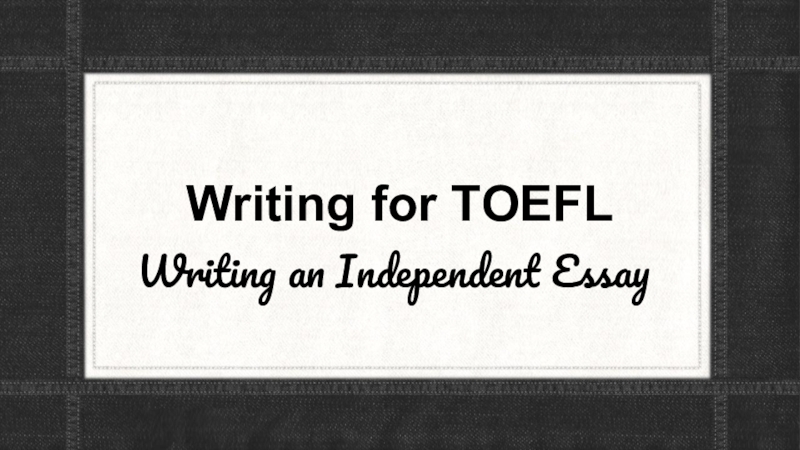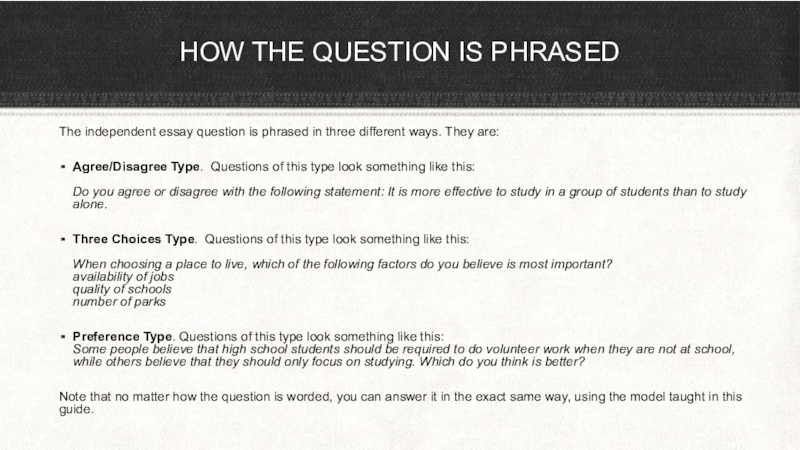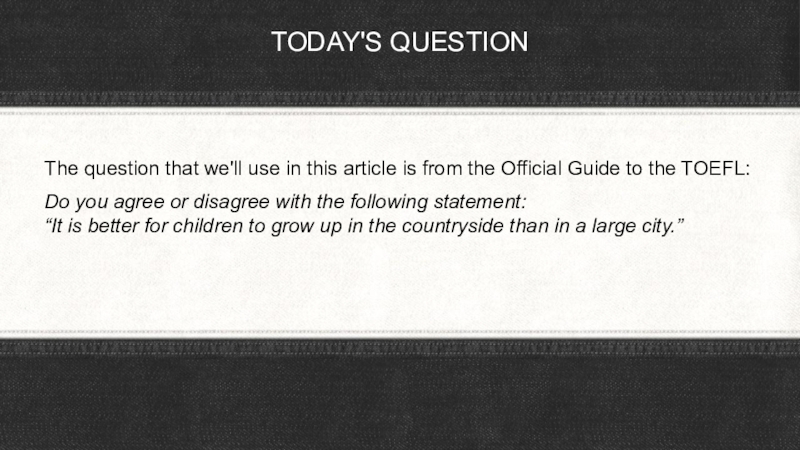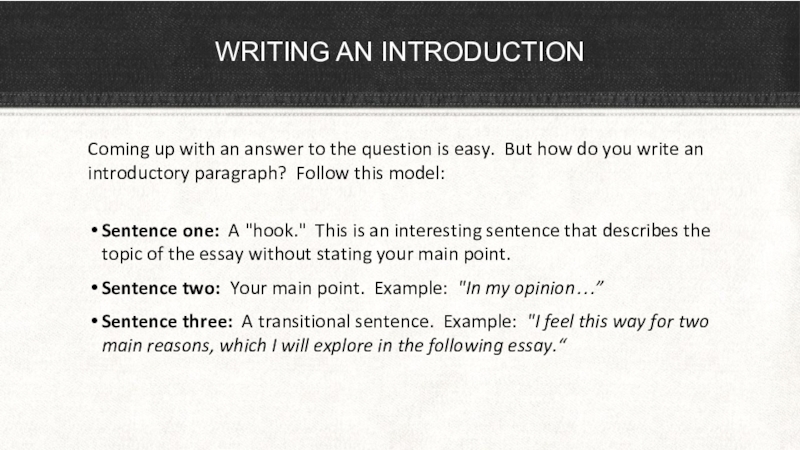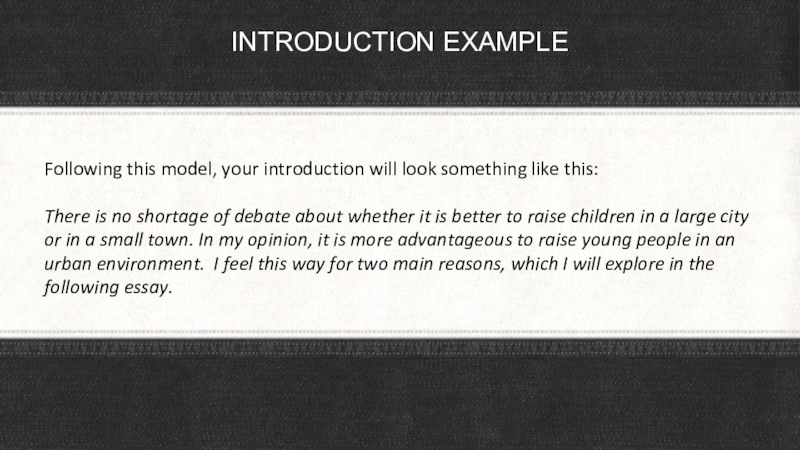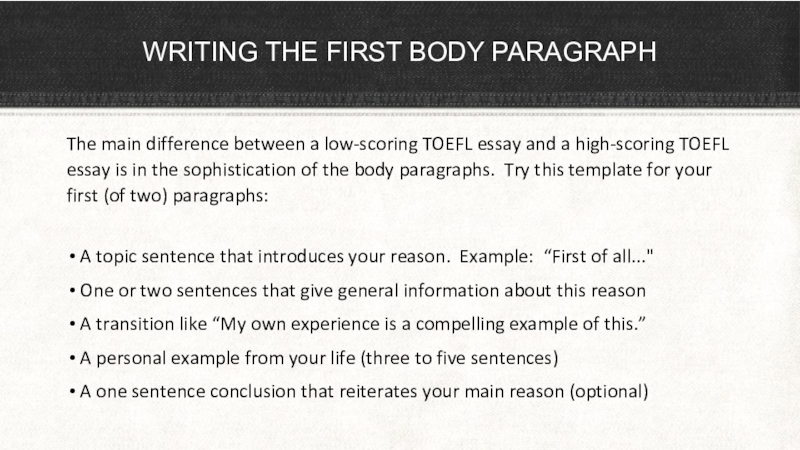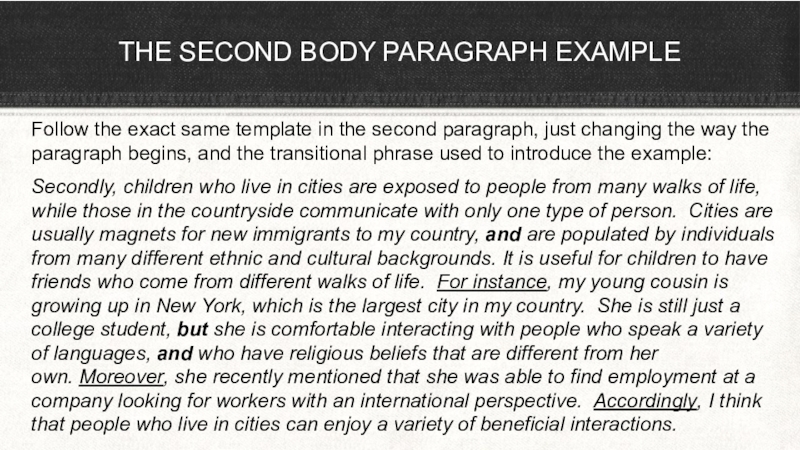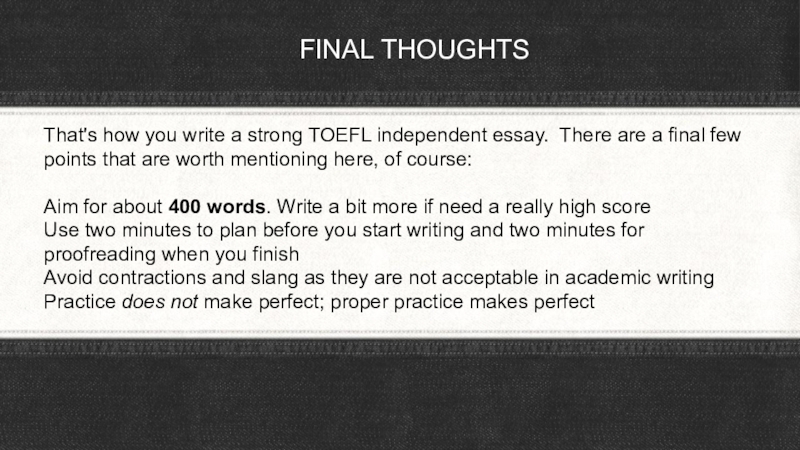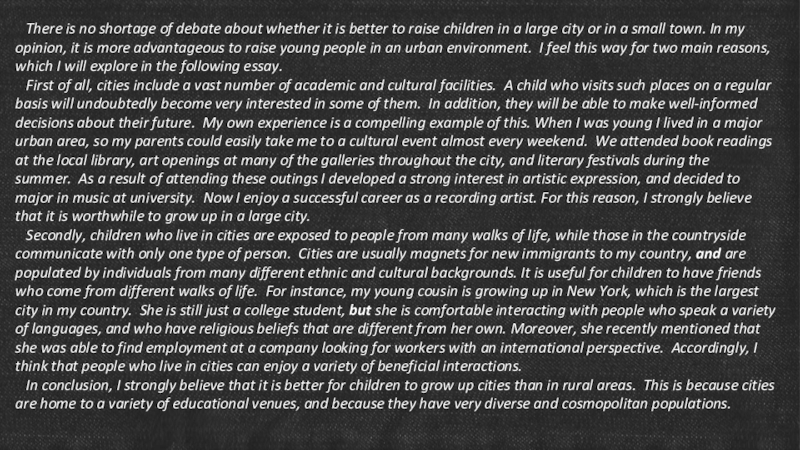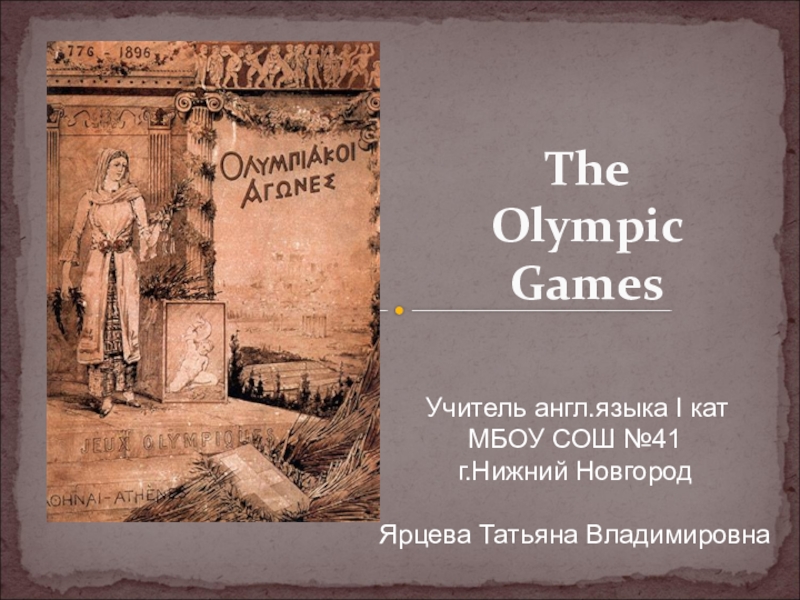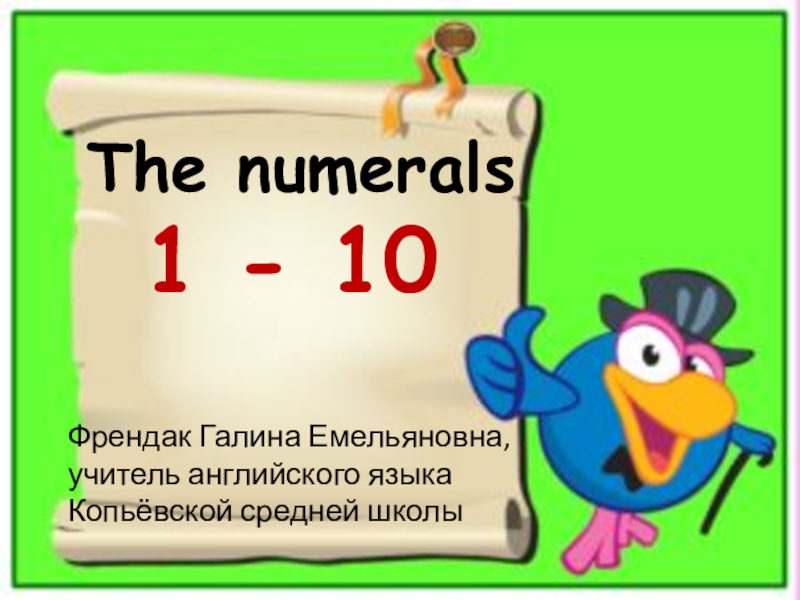- Главная
- Разное
- Образование
- Спорт
- Естествознание
- Природоведение
- Религиоведение
- Французский язык
- Черчение
- Английский язык
- Астрономия
- Алгебра
- Биология
- География
- Геометрия
- Детские презентации
- Информатика
- История
- Литература
- Математика
- Музыка
- МХК
- Немецкий язык
- ОБЖ
- Обществознание
- Окружающий мир
- Педагогика
- Русский язык
- Технология
- Физика
- Философия
- Химия
- Шаблоны, фоны, картинки для презентаций
- Экология
- Экономика
Презентация, доклад Writing for TOEFL
Содержание
- 1. Презентация Writing for TOEFL
- 2. HOW THE QUESTION IS PHRASEDThe independent essay
- 3. The question that we'll use in
- 4. WRITING AN INTRODUCTIONComing up with an answer
- 5. Following this model, your introduction will
- 6. REMEMBERThere are a few things to keep
- 7. WRITING THE FIRST BODY PARAGRAPHThe main difference
- 8. FIST BODY PARAGRAPH EXAMPLEThat would result in
- 9. REMEMBERThere are a few things to keep
- 10. THE SECOND BODY PARAGRAPH EXAMPLEFollow the exact
- 11. That's how you write the body of
- 12. Conclusions are easy. Try this template: “In
- 13. CONCLUSION EXAMPLETo produce something that looks like
- 14. REMEMBERHere's what you should keep in mind:
- 15. FINAL THOUGHTSThat's how you write a strong
- 16. There is no shortage of
- 17. GOOD LUCK
- 18. Слайд 18
HOW THE QUESTION IS PHRASEDThe independent essay question is phrased in three different ways. They are: Agree/Disagree Type. Questions of this type look something like this: Do you agree or disagree with the following statement:
Слайд 2HOW THE QUESTION IS PHRASED
The independent essay question is phrased in
three different ways. They are:
Agree/Disagree Type. Questions of this type look something like this: Do you agree or disagree with the following statement: It is more effective to study in a group of students than to study alone.
Three Choices Type. Questions of this type look something like this: When choosing a place to live, which of the following factors do you believe is most important? availability of jobs quality of schools number of parks
Preference Type. Questions of this type look something like this: Some people believe that high school students should be required to do volunteer work when they are not at school, while others believe that they should only focus on studying. Which do you think is better?
Note that no matter how the question is worded, you can answer it in the exact same way, using the model taught in this guide.
Agree/Disagree Type. Questions of this type look something like this: Do you agree or disagree with the following statement: It is more effective to study in a group of students than to study alone.
Three Choices Type. Questions of this type look something like this: When choosing a place to live, which of the following factors do you believe is most important? availability of jobs quality of schools number of parks
Preference Type. Questions of this type look something like this: Some people believe that high school students should be required to do volunteer work when they are not at school, while others believe that they should only focus on studying. Which do you think is better?
Note that no matter how the question is worded, you can answer it in the exact same way, using the model taught in this guide.
Слайд 3 The question that we'll use in this article is from the Official
Guide to the TOEFL:
Do you agree or disagree with the following statement: “It is better for children to grow up in the countryside than in a large city.”
Do you agree or disagree with the following statement: “It is better for children to grow up in the countryside than in a large city.”
TODAY'S QUESTION
Слайд 4WRITING AN INTRODUCTION
Coming up with an answer to the question is
easy. But how do you write an introductory paragraph? Follow this model:
Sentence one: A "hook." This is an interesting sentence that describes the topic of the essay without stating your main point.
Sentence two: Your main point. Example: "In my opinion…”
Sentence three: A transitional sentence. Example: "I feel this way for two main reasons, which I will explore in the following essay.“
Sentence one: A "hook." This is an interesting sentence that describes the topic of the essay without stating your main point.
Sentence two: Your main point. Example: "In my opinion…”
Sentence three: A transitional sentence. Example: "I feel this way for two main reasons, which I will explore in the following essay.“
Слайд 5 Following this model, your introduction will look something like this: There is
no shortage of debate about whether it is better to raise children in a large city or in a small town. In my opinion, it is more advantageous to raise young people in an urban environment. I feel this way for two main reasons, which I will explore in the following essay.
INTRODUCTION EXAMPLE
Слайд 6REMEMBER
There are a few things to keep in mind as you
write your introduction:
State your main point clearly; don’t be ambiguous.
Don’t write an overly long hook
Don’t waste time; spend no more than five minutes on your introduction.
You can summarize your supporting reasons in the introduction, but this is not essential.
Don't copy and paste the statement from the prompt. Summarize it instead.
Some people think that three sentences is too short, but I am of the opinion that advanced students should instead focus on their body paragraphs, where they can show off their grammar and reasoning skills. If you really want a longer introduction, write a two sentence hook or summarize your reasons (at the end of the paragraph). Note how I used synonyms instead of repeating "city" and "children" in the paragraph.
State your main point clearly; don’t be ambiguous.
Don’t write an overly long hook
Don’t waste time; spend no more than five minutes on your introduction.
You can summarize your supporting reasons in the introduction, but this is not essential.
Don't copy and paste the statement from the prompt. Summarize it instead.
Some people think that three sentences is too short, but I am of the opinion that advanced students should instead focus on their body paragraphs, where they can show off their grammar and reasoning skills. If you really want a longer introduction, write a two sentence hook or summarize your reasons (at the end of the paragraph). Note how I used synonyms instead of repeating "city" and "children" in the paragraph.
Слайд 7WRITING THE FIRST BODY PARAGRAPH
The main difference between a low-scoring TOEFL
essay and a high-scoring TOEFL essay is in the sophistication of the body paragraphs. Try this template for your first (of two) paragraphs:
A topic sentence that introduces your reason. Example: “First of all..."
One or two sentences that give general information about this reason
A transition like “My own experience is a compelling example of this.”
A personal example from your life (three to five sentences)
A one sentence conclusion that reiterates your main reason (optional)
A topic sentence that introduces your reason. Example: “First of all..."
One or two sentences that give general information about this reason
A transition like “My own experience is a compelling example of this.”
A personal example from your life (three to five sentences)
A one sentence conclusion that reiterates your main reason (optional)
Слайд 8FIST BODY PARAGRAPH EXAMPLE
That would result in a paragraph looking something
like this:
First of all, cities include a vast number of academic and cultural facilities. A child who visits such places on a regular basis will undoubtedly become very interested in some of them. In addition, they will be able to make well-informed decisions about their future. My own experience is a compelling example of this. When I was young I lived in a major urban area, so my parents could easily take me to a cultural event almost every weekend. We attended book readings at the local library, art openings at many of the galleries throughout the city, and literary festivals during the summer. As a result of attending these outings I developed a strong interest in artistic expression, and decided to major in music at university. Now I enjoy a successful career as a recording artist. For this reason, I strongly believe that it is worthwhile to grow up in a large city.
Слайд 9REMEMBER
There are a few things to keep in mind as you
write this paragraph:
Spend about nine minutes writing each body paragraph.
Don’t repeat words. Try to avoid using the same word more than 2 or 3 times in the entire essay. The range of your vocabulary matters.
Use transitional words and phrases (discourse words). These are underlined in the above example. You can read more about this issue.
You need to use conjunctions. Easiest is to use coordinating conjunctions (especially “and,” “so,” and “but”). These are bold in the above example. You can read more about this issue.
Avoid overly short sentences (less than seven words) and overly long sentences (more than 60 words).
You don’t need to write about both sides (or all three choices).
Spend about nine minutes writing each body paragraph.
Don’t repeat words. Try to avoid using the same word more than 2 or 3 times in the entire essay. The range of your vocabulary matters.
Use transitional words and phrases (discourse words). These are underlined in the above example. You can read more about this issue.
You need to use conjunctions. Easiest is to use coordinating conjunctions (especially “and,” “so,” and “but”). These are bold in the above example. You can read more about this issue.
Avoid overly short sentences (less than seven words) and overly long sentences (more than 60 words).
You don’t need to write about both sides (or all three choices).
Слайд 10THE SECOND BODY PARAGRAPH EXAMPLE
Follow the exact same template in the
second paragraph, just changing the way the paragraph begins, and the transitional phrase used to introduce the example:
Secondly, children who live in cities are exposed to people from many walks of life, while those in the countryside communicate with only one type of person. Cities are usually magnets for new immigrants to my country, and are populated by individuals from many different ethnic and cultural backgrounds. It is useful for children to have friends who come from different walks of life. For instance, my young cousin is growing up in New York, which is the largest city in my country. She is still just a college student, but she is comfortable interacting with people who speak a variety of languages, and who have religious beliefs that are different from her own. Moreover, she recently mentioned that she was able to find employment at a company looking for workers with an international perspective. Accordingly, I think that people who live in cities can enjoy a variety of beneficial interactions.
Secondly, children who live in cities are exposed to people from many walks of life, while those in the countryside communicate with only one type of person. Cities are usually magnets for new immigrants to my country, and are populated by individuals from many different ethnic and cultural backgrounds. It is useful for children to have friends who come from different walks of life. For instance, my young cousin is growing up in New York, which is the largest city in my country. She is still just a college student, but she is comfortable interacting with people who speak a variety of languages, and who have religious beliefs that are different from her own. Moreover, she recently mentioned that she was able to find employment at a company looking for workers with an international perspective. Accordingly, I think that people who live in cities can enjoy a variety of beneficial interactions.
Слайд 11That's how you write the body of your essay. Some students
want to write three body paragraphs, but I strongly advise against that. Doing so will mean that your paragraphs are short and under-developed. Two long paragraphs are better than three short paragraphs.
REMEMBER
Слайд 12Conclusions are easy. Try this template:
“In conclusion, I strongly believe...”
"This is
because REASON ONE, and REASON TWO."
WRITING A CONCLUSION
Слайд 13CONCLUSION EXAMPLE
To produce something that looks like this:
In conclusion, I
strongly believe that it is better for children to grow up cities than in rural areas. This is because cities are home to a variety of educational venues, and because they have very diverse and cosmopolitan populations.
Слайд 14REMEMBER
Here's what you should keep in mind:
Keep it brief; the purpose
is to summarize your main point and two reasons
You can include a “clincher” (a final original thought) if you want, but don’t write anything needlessly complex
You can include a “clincher” (a final original thought) if you want, but don’t write anything needlessly complex
Слайд 15FINAL THOUGHTS
That's how you write a strong TOEFL independent essay. There
are a final few points that are worth mentioning here, of course:
Aim for about 400 words. Write a bit more if need a really high score
Use two minutes to plan before you start writing and two minutes for proofreading when you finish
Avoid contractions and slang as they are not acceptable in academic writing
Practice does not make perfect; proper practice makes perfect
Aim for about 400 words. Write a bit more if need a really high score
Use two minutes to plan before you start writing and two minutes for proofreading when you finish
Avoid contractions and slang as they are not acceptable in academic writing
Practice does not make perfect; proper practice makes perfect
Слайд 16 There is no shortage of debate about whether it
is better to raise children in a large city or in a small town. In my opinion, it is more advantageous to raise young people in an urban environment. I feel this way for two main reasons, which I will explore in the following essay.
First of all, cities include a vast number of academic and cultural facilities. A child who visits such places on a regular basis will undoubtedly become very interested in some of them. In addition, they will be able to make well-informed decisions about their future. My own experience is a compelling example of this. When I was young I lived in a major urban area, so my parents could easily take me to a cultural event almost every weekend. We attended book readings at the local library, art openings at many of the galleries throughout the city, and literary festivals during the summer. As a result of attending these outings I developed a strong interest in artistic expression, and decided to major in music at university. Now I enjoy a successful career as a recording artist. For this reason, I strongly believe that it is worthwhile to grow up in a large city.
Secondly, children who live in cities are exposed to people from many walks of life, while those in the countryside communicate with only one type of person. Cities are usually magnets for new immigrants to my country, and are populated by individuals from many different ethnic and cultural backgrounds. It is useful for children to have friends who come from different walks of life. For instance, my young cousin is growing up in New York, which is the largest city in my country. She is still just a college student, but she is comfortable interacting with people who speak a variety of languages, and who have religious beliefs that are different from her own. Moreover, she recently mentioned that she was able to find employment at a company looking for workers with an international perspective. Accordingly, I think that people who live in cities can enjoy a variety of beneficial interactions. In conclusion, I strongly believe that it is better for children to grow up cities than in rural areas. This is because cities are home to a variety of educational venues, and because they have very diverse and cosmopolitan populations.
Secondly, children who live in cities are exposed to people from many walks of life, while those in the countryside communicate with only one type of person. Cities are usually magnets for new immigrants to my country, and are populated by individuals from many different ethnic and cultural backgrounds. It is useful for children to have friends who come from different walks of life. For instance, my young cousin is growing up in New York, which is the largest city in my country. She is still just a college student, but she is comfortable interacting with people who speak a variety of languages, and who have religious beliefs that are different from her own. Moreover, she recently mentioned that she was able to find employment at a company looking for workers with an international perspective. Accordingly, I think that people who live in cities can enjoy a variety of beneficial interactions. In conclusion, I strongly believe that it is better for children to grow up cities than in rural areas. This is because cities are home to a variety of educational venues, and because they have very diverse and cosmopolitan populations.
